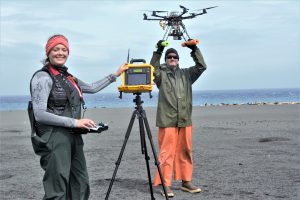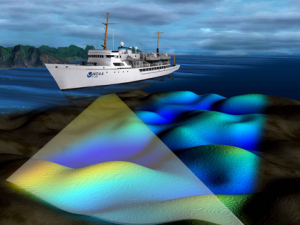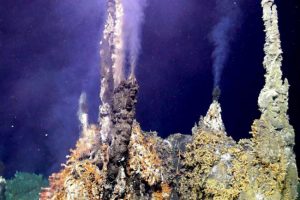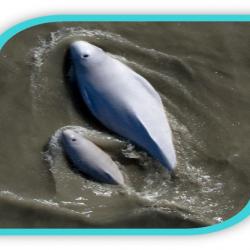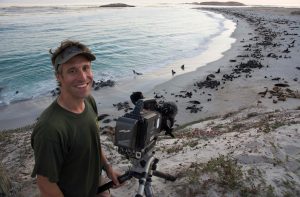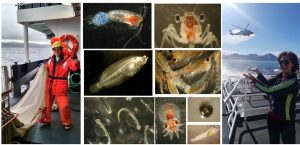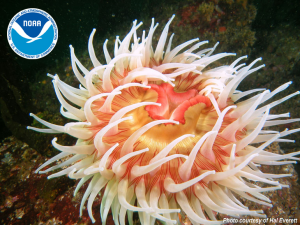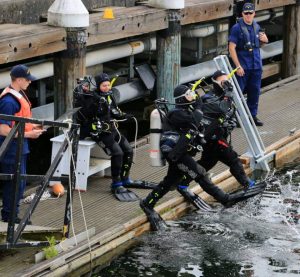Talking Trash: Marine Debris Research in Alaska
Peter Murphy, NOAA’s Marine Debris Program in Seattle, WA With Alaska’s extensive, rugged and remote coastline, longer than the rest of the United States combined, innovative and creative approaches are required to address marine debris. Join us to learn about types of marine debris of all shapes and sizes, as well as projects that are…
Read MoreDrones, Scat, and the Joys of Marine Mammal Fieldwork in Alaska
Katie Sweeney, NOAA Fisheries Alaska Fisheries Science Center in Seattle, WA How do we study marine mammals and what do we find out? Take a journey through the types of surveys and tools that are used to study Steller sea lions and northern fur seals in Alaska, and the challenges faced by scientists who study…
Read MorePing! – Using sound to map Alaska’s seafloor
Jessica Murphy and LTjg Michelle Levano, NOAA’s Office of Coast Survey in Seattle, WA Like marine mammals using sound to “see” their underwater environment, scientists also use sound to determine what the seafloor looks like! Mapping the seafloor provides information for many purposes, including safe navigation of fishing vessels and helping pinpoint where marine animals…
Read MoreExploring the Ocean Seafloor: Underwater Volcanoes and their Habitats
Colleen Hoffman, Cooperative Institute for Climate, Ocean, and Ecosystem Studies and NOAA Pacific Marine Environmental Lab in Seattle, WA Come learn about the explosive world of underwater volcanoes! Alien looking organisms, robots and submarines, and eruptions are all part of the fun in studying these systems 10,000-13,000 feet below sea level. Narrated by a marine…
Read MoreBaby Beluga in the Shallow Gray Sea – looking for newborn whales with drones in Cook Inlet, Alaska
Kim Goetz, NOAA Alaska Fisheries Science Center in Seattle, WA Learn about the endangered population of Cook Inlet beluga whales which regularly swim past local Anchorage landmarks such as the Port, Kincaid Park, the airport, and Bird Point in Turnagain Arm. We will talk about how belugas live, see cool photos of them taken from…
Read MoreDemystifying Science through Video
Filmmaker Paul Hillman, NOAA Fisheries Communications Office in Seattle, WA Science can be a tough nut to crack for a lot of people, and sometimes getting the information straight from a scientist can be full of technical jargon and difficult to understand. But science is the backbone for many of the decisions and policies that…
Read MoreThe Wonderful World of Plankton: The Tiny Animals of the Sea
Colleen Harpold and Alison Deary, NOAA’s Alaska Fisheries Science Center in Seattle, WA Come learn about the exciting world of plankton! Everything from baby fishes, crab and octopus to animals like copepods and krill that spend their entire lives floating in the ocean. Narrated by two marine scientists with different career tracks, explore the tiny…
Read MoreSwimming in Dirty Water – Pollution and Fish Health
Cathy Laetz, NOAA’s Northwest Fisheries Science Center in Seattle, WA Every day humans produce tons of chemicals that can drain into our rivers, lakes, and oceans. In the Pacific Northwest, these waters are important habitat for fish like salmon. You wouldn’t like to swim at a polluted beach and our science tells us that the…
Read MoreExploring Olympic Coast National Marine Sanctuary – Virtual Tour and Trivia BINGO
Jacqueline Laverdure, NOAA’s Olympic Coast National Marine Sanctuary in Port Angeles, WA Explore the wonders of America’s Ocean and Great Lakes Treasures – Our national marine sanctuaries! Join us for this fun and interactive virtual tour as we visit our national marine sanctuaries and dive deep into Olympic Coast National Marine Sanctuary. This journey includes…
Read MoreFrom Training to Underwater Exploration: Take a Deep Dive the NOAA Diving Center
Jessica Keller and Zachary Hileman, both from the NOAA Diving Center in Seattle, WA and Stephanie Gandulla, NOAA’s Thunder Bay National Marine Sanctuary in Alpena, MI Follow the pathway to become a NOAA diver and beyond! Scientific diving is one of the main types of diving conducted throughout NOAA, and the NOAA Diving Center trains…
Read More
